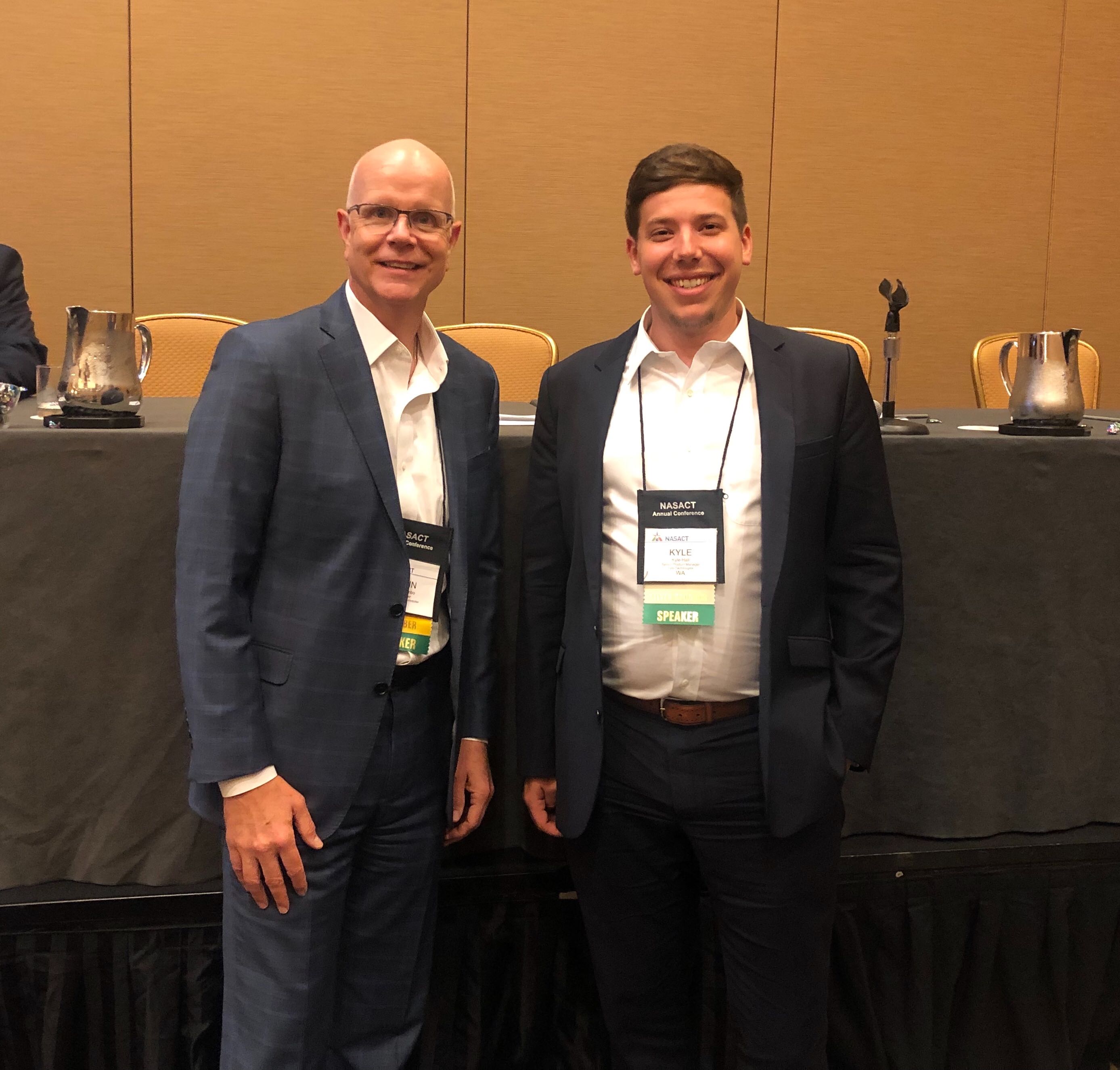CT Comptroller's Leap of Faith
September 12, 2019 by Meredith Trimble

“Democratization of data gets messy,” said Kevin Lembo, state comptroller for the State of Connecticut. “You make data available for everyone, but then what? What happens?” He answered this and other questions during a panel discussion at August’s National Association of State Auditors, Comptrollers and Treasurers (NASACT) annual conference.
Moderated by Arkansas Legislative Auditor, Roger Norman, and Tyler’s Kyle Hall, the session offered public sector professionals a chance to hear from Comptroller Lembo, who talked openly about his state’s adoption of robust open data programs and their use as agents of change.

Connecticut Comptroller Kevin Lembo (left), Kyle Hall, Tyler Technologies (right)
Public Journeys
OpenConnecticut is one of the most visited financial transparency portals in the country, with millions of hits for a small population. OpenConnecticut, the Connecticut Open Data Portal, and the Connecticut Data Collaborative offer millions of rows of datasets that benefit policymakers, agencies, and the public.
“I love the fact that academics and media, who use it more than anyone, will download a dataset and take it away back to their spaces and mine that proof of concept; compare us to other states,” Lembo said. “And then there’s the moment when they reappear with the findings, and they say ‘you said this was going to happen, we invested money a decade ago, and here’s where we are. Here are our thoughts based on what other states have done. Maybe it’s time to rethink this.’“
“It’s a very threatening thing for governments, where the inclination is to close up. It forces you into opening up, and then there’s the leap of faith. The leap of faith is that your constituents will go on that journey with you — that they’re not going to just use it to throw pot shots at you, but that the community culture ends up being one of collaboration and you start to work together.”
Agency Energy
“Inside agencies,” Lembo noted, “I hear a new energy, particularly among the younger employees.” These employees often spend their own time thinking through problems or challenges. “It might not be in their own silo at work, but they have thoughts about different ways to do things,” Lembo said. “It forces you into collaboration whether you want it or not. Suddenly, you’re all talking about a similar set of facts, and it’s openly available and accessible.”
Commissioners, too, have benefited directly from the open data programs. Lembo noted how they are newly looking at their own information and comparing themselves to others. “In a self-directed way, they’re going in and looking at everything from what they spend in paper products to how many people it takes to fill a particular function in relation to other similar agencies.” This executive examination has led to insight and change even on the smallest levels, such as recognizing disparities in agency bottled water contracts and leveraging that knowledge for price adjustments.
ROI on Open Data
Connecticut’s operations prove that transparency isn’t just a box to check but an initiative that grows over time. Some benefits happen immediately. In starting any open data program, for example, the data itself must be mined and cleaned before it’s released. Corrections, public safety, and judicial employee protected data must be flagged. This is an important opportunity to improve information all around.
Public interactions also improve. When residents can find basic information on their own, overall engagement is enhanced. “We still get questions,” Lembo noted, “but we get a more informed set of questions and a better interaction with the public.”
Seeing these benefits, Connecticut’s legislature has weighed in, seeking information to determine their return on investment in certain programs. For the state’s Department of Economic and Community Development (DECD), for example, the legislature unanimously — in both chambers — passed legislation to make visible where development money was going in order to analyze outcomes against the cost of doing nothing. This initiative was vetoed by the state’s former governor, but Lembo and lawmakers were undeterred. “In making public policy,” Lembo stated, “I go by the ‘massage therapist strategy.’ Massage therapists push on a spot and ask if it hurts. If you’re developing policy and you’re pushing on a spot and they start screaming, you know you’re probably pushing the right spot.” With the help of media interest, DECD’s data is now out in the open and lawmakers have new insight into how and where the agency is helping job creation.
Community Hacking
To help make meaningful use of Connecticut’s data, Lembo partnered with town-level SeeClickFix 311 service in a civic hack night. Lembo’s team devised a list of questions, and diverse participants dug in to find the answers. State employee health insurance data, for example, showed a spike in emergency room utilization in spite of a strong communications campaign around higher co-pay costs. Hackers plotted employees, major youth sports leagues, and emergency care facilities, and developed an app to help state employees find their nearest covered care location, whether they’re on the field or at home.
The Data Story
“The data tells a story of who we are,” Lembo said. “The data tells other people what our priorities are. If you didn’t budget for something or weren’t good custodians of the public dollar, that tells a story. When I back up from that, it’s pretty clear to me that we need to continue to provide this information and explain it as a civic engagement tool.” While noting that opening up information can at times be a double-edged sword, Lembo stressed its overall importance to good policy and good democracy. States can’t implement open data programs without opening themselves up to scrutiny and questions. “That’s going to happen,” Lembo said, “but it’s worth it.”